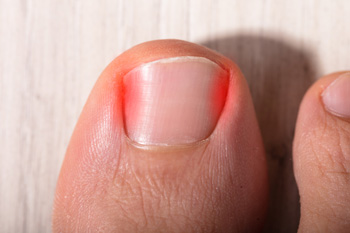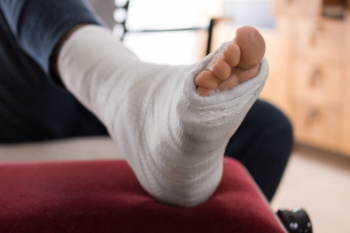Connect With Us
Blog

Chronic tendon injuries in the foot and ankle happen when a tendon becomes irritated or damaged over time, often due to overuse, poor foot mechanics, or past injuries that did not fully heal. Examples include Achilles tendinopathy and posterior tibial tendon dysfunction. These conditions can cause long-lasting pain, stiffness and weakness, especially during activity. Treatment focuses on reducing stress on the tendon and supporting healing. This may involve rest, custom orthotics, stretching and strengthening exercises, targeted exercises, or anti-inflammatory treatments. In more severe cases, advanced therapies or surgery may be considered. Chronic tendon injuries do not usually improve on their own and can worsen if left untreated. If you have ongoing foot or ankle pain that seems to flare up during movement or does not go away with rest, it is suggested that you see a podiatrist for proper evaluation and care.
Achilles tendon injuries need immediate attention to avoid future complications. If you have any concerns, contact one of our podiatrists of Advanced Foot & Ankle. Our doctors can provide the care you need to keep you pain-free and on your feet.
What Is the Achilles Tendon?
The Achilles tendon is a tendon that connects the lower leg muscles and calf to the heel of the foot. It is the strongest tendon in the human body and is essential for making movement possible. Because this tendon is such an integral part of the body, any injuries to it can create immense difficulties and should immediately be presented to a doctor.
What Are the Symptoms of an Achilles Tendon Injury?
There are various types of injuries that can affect the Achilles tendon. The two most common injuries are Achilles tendinitis and ruptures of the tendon.
Achilles Tendinitis Symptoms
- Inflammation
- Dull to severe pain
- Increased blood flow to the tendon
- Thickening of the tendon
Rupture Symptoms
- Extreme pain and swelling in the foot
- Total immobility
Treatment and Prevention
Achilles tendon injuries are diagnosed by a thorough physical evaluation, which can include an MRI. Treatment involves rest, physical therapy, and in some cases, surgery. However, various preventative measures can be taken to avoid these injuries, such as:
- Thorough stretching of the tendon before and after exercise
- Strengthening exercises like calf raises, squats, leg curls, leg extensions, leg raises, lunges, and leg presses
If you have any questions please feel free to contact our offices located in Newburg and Taylorsville, KY . We offer the newest diagnostic tools and technology to treat your foot and ankle needs.

An ingrown toenail happens when the edge of the nail grows into the skin, causing pain, swelling, and sometimes infection. One helpful treatment is a gutter splint. This is a small, smooth tube placed under the edge of the nail to gently lift it away from the skin. The splint takes pressure off the sore area and gives the skin a chance to heal. Over time, the nail grows out in a better position. Gutter splints are used when the problem keeps coming back or when surgery is not the best option. They are safe, do not hurt, and can be a good choice for both children and adults. A podiatrist will make sure the splint fits right and teach you how to care for your toe at home. If you have a painful ingrown toenail, it is suggested that you see a podiatrist for a proper diagnosis and treatment.
Ingrown toenails may initially present themselves as a minor discomfort, but they may progress into an infection in the skin without proper treatment. For more information about ingrown toenails, contact one of our podiatrists of Advanced Foot & Ankle. Our doctors can provide the care you need to keep you pain-free and on your feet.
Ingrown Toenails
Ingrown toenails are caused when the corner or side of a toenail grows into the soft flesh surrounding it. They often result in redness, swelling, pain, and in some cases, infection. This condition typically affects the big toe and may recur if it is not treated properly.
Causes
- Improper toenail trimming
- Genetics
- Improper shoe fitting
- Injury from pedicures or nail picking
- Abnormal gait
- Poor hygiene
You are more likely to develop an ingrown toenail if you are obese, have diabetes, arthritis, or have any fungal infection in your nails. Additionally, people who have foot or toe deformities are at a higher risk of developing an ingrown toenail.
Symptoms
Some symptoms of ingrown toenails are redness, swelling, and pain. In rare cases, there may be a yellowish drainage coming from the nail.
Treatment
Ignoring an ingrown toenail can have serious complications. Infections of the nail border can progress to a deeper soft-tissue infection, which can then turn into a bone infection. You should always speak with your podiatrist if you suspect you have an ingrown toenail, especially if you have diabetes or poor circulation.
If you have any questions, please feel free to contact our offices located in Newburg and Taylorsville, KY . We offer the newest diagnostic and treatment technologies for all your foot care needs.

A broken ankle can cause significant discomfort and mobility issues. One of the most noticeable symptoms is intense pain, which often worsens with movement or pressure. Swelling and bruising surrounding the ankle are common due to internal bleeding and inflammation. In severe cases, joint deformity may be present, indicating a misalignment of the bones. Many individuals with a broken ankle find it impossible to bear weight on the affected foot, as any attempt to stand or walk can cause extreme pain. The area may also feel tender to the touch, and the skin might appear discolored. If you have fallen and have any of the above symptoms, it is suggested that you promptly contact a podiatrist who can provide an accurate diagnosis and offer appropriate treatment solutions.
Broken ankles need immediate treatment. If you are seeking treatment, contact one of our podiatrists from Advanced Foot & Ankle. Our doctors can provide the care you need to keep you pain-free and on your feet.
Broken Ankles
A broken ankle is experienced when a person fractures their tibia or fibula in the lower leg and ankle area. Both of these bones are attached at the bottom of the leg and combine to form what we know to be our ankle.
When a physician is referring to a break of the ankle, he or she is usually referring to a break in the area where the tibia and fibula are joined to create our ankle joint. Ankles are more prone to fractures because the ankle is an area that suffers a lot of pressure and stress. There are some obvious signs when a person experiences a fractured ankle, and the following symptoms may be present.
Symptoms of a Fractured Ankle
- Excessive pain when the area is touched or when any pressure is placed on the ankle
- Swelling around the area
- Bruising of the area
- Area appears to be deformed
If you suspect an ankle fracture, it is recommended to seek treatment as soon as possible. The sooner you have your podiatrist diagnose the fracture, the quicker you’ll be on the way towards recovery.
If you have any questions, please feel free to contact our offices located in Newburg and Taylorsville, KY . We offer the newest diagnostic and treatment technologies for all your foot care needs.

